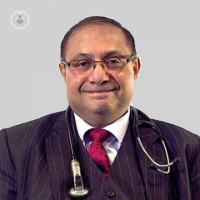Multiple morbidities: how do you treat a patient with more than one condition?
Written by:Multiple morbidities is a situation where a patient has more than one long-term condition. These conditions may be related, though they may not be, and will each have their own set of medication to treat the problem. The problem can arise where the medications work against each other, cancel each other out, or exacerbate one of the other long-term conditions.
We speak to leading London-based consultant physician Dr Mashkur Khan all about this important issue in this article.

Multiple morbidity: the problem with polypharmacy
One of the main problems associated with a patient with multiple morbidity is that of polypharmacy. Polypharmacy refers to being prescribed multiple drugs at the same time. For example, a patient suffering from high blood pressure, diabetes and osteoporosis may be on medication for all of these conditions at once, and over long periods of time.
All drugs, including prescribed medication, may have detrimental effects if taken over time, especially if taken along with other medication. The different drugs can mix together and cause new side-effects that are not always understood, such as:
- dizziness;
- confusion,and;
- hallucination.
At times, the side-effects can be very serious.
Studies have found that patients prescribed more than four different kinds of medication are at a higher risk of developing further long-term conditions, and an increased risk of falls.
How do we face the problem of polypharmacy?
One of the ways of solving the problem of polypharmacy is to stop some of the long-term medications that are being taken by a patient. This is because often, a patient may have been taking a drug for years without it being reviewed. There may be better ones available, or the drug may no longer be having an effect, or the side-effects of the combined drugs may be more detrimental than the positive effects of the medication.
More work needs to be done to treat problems before they arise. Looking at preventative methods to treat conditions, such as obesity-related problems, before they reach crisis point is an important step.
Genetic profiling would be a positive step forward. Researching which drugs work better on which patients, so personalised medication can be developed for each patient. For example, it is known that anti-depressants only work on 15 to 20 per cent of people that take them, so many people are taking them with none of the positive side-effects, and only the negative ones.
Often patients, especially elderly patients who may be feeling lonely or be inactive, may be taking medication but it isn't the solution to the problem. Tackling the core problem is often more beneficial in the long-run.
If you want to make an appointment with Dr Khan to discuss multiple morbidities, visit his Top Doctors profile here.


